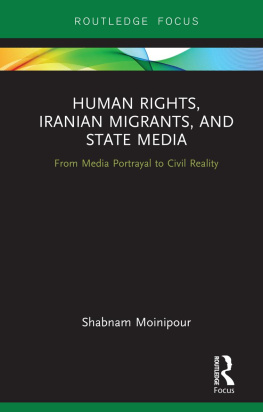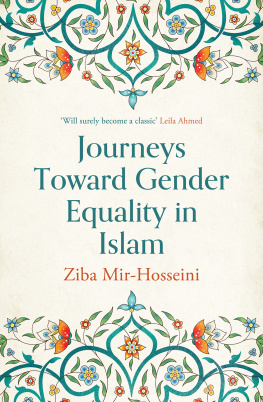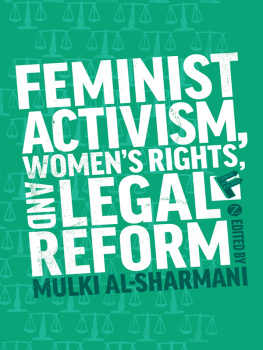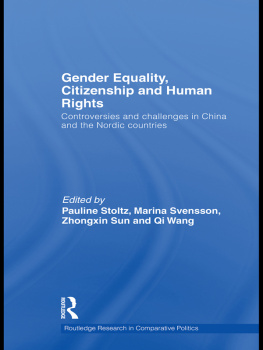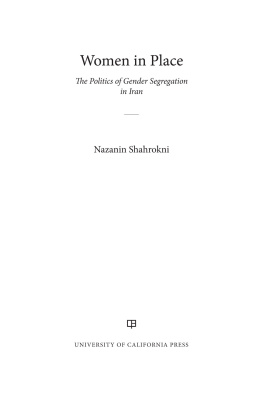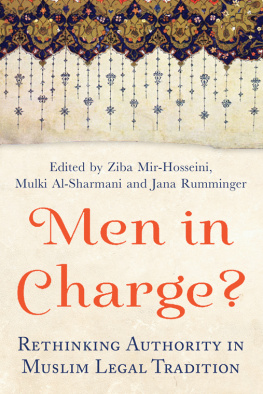Leila Alikarami holds a PhD from SOAS. She is a practicing lawyer and human rights activist who grew up in Tehran, where she completed her legal training with Nobel Peace Laureate Shirin Ebadi. Since 2001, Alikarami has focused on women's and children's rights and in 2009 she accepted the RAW in War (Reach All Women in War) Anna Politkovskaya Award on behalf of the women of Iran and the One Million Signatures campaign.

I.B.TAURIS
Bloomsbury Publishing Plc
50 Bedford Square, London, WC1B 3DP, UK
1385 Broadway, New York, NY 10018, USA
BLOOMSBURY, I.B.TAURIS and the Diana logo are trademarks of Bloomsbury Publishing Plc
First published in Great Britain 2019
Copyright Leila Alikarami 2019
Leila Alikarami has asserted her right under the Copyright, Designs and Patents Act, 1988, to be identified as Author of this work.
Cover design: Simon Levy Cover image epa european pressphoto agency b.v. / Alamy Stock Photo.
All rights reserved. No part of this publication may be reproduced or transmitted in any form or by any means, electronic or mechanical, including photocopying, recording, or any information storage or retrieval system, without prior permission in writing from the publishers.
Bloomsbury Publishing Plc does not have any control over, or responsibility for, any third-party websites referred to or in this book. All internet addresses given in this book were correct at the time of going to press. The author and publisher regret any inconvenience caused if addresses have changed or sites have ceased to exist, but can accept no responsibility for any such changes.
A catalogue record for this book is available from the British Library.
A catalogue record for this book is available from the Library of Congress.
ISBN: 978 1 7845 33168
ePDF: 978 1 7883 18877
eBook: 978 1 7883 18860
Series: International Library of Iranian Studies
To my son, Parsa, who gives me courage to never give up
The Islamic Republic has not opened the gates. Women are jumping over the fences.
Haideh Moghissi
NOTE ON TRANSLITERATION
This book follows the transliteration system currently adopted in the journal Iranian Studies. The names of persons are exempt from the diacritic rules and are at times written in the most common form. Some nouns and widely adopted terms, such as Islam and Imam, are also written without diacritics.
GLOSSARY OF THE MOST COMMONLY USED PERSIAN AND ARABIC TERMS AND ABBREVIATIONS
| del | Just |
| qel | Be cognisant and aware |
| Blugh | Child's puberty |
| Diyeh | Compensation for murder or injuries under Islamic law, also known as blood money |
| Eddeh | The legal period during which a wife is not allowed to remarry, and her husband can return to the marriage whenever he desires |
| Efsd-e felarz | Spreading corruption on earth |
| Ejtehd | Juridical reasoning of a qualified Islamic jurist |
| Faskh | Judicial annulment of a marriage |
| Fatw | Legal or religious opinion by a qualified Islamic jurist |
| Feqh | Islamic jurisprudence |
| Foqah | Jurists |
| Hadd | Fixed punishments |
| Hadd-e Jald | Punishment by lashes |
| Hejb | Compulsory prescribed dress for women |
| Ijb | Offer |
| Ejm | Juristic consensus |
| Lavt | Male homosexuality, sodomy |
| Khul | Dissolution of a marriage, initiated by the wife |
| Majles | The Iranian Parliament |
| Mahdur-o dam | Deserving death |
| Mahriyeh | Marriage portion payable to the wife |
| Maslahat | Benefit, advantage |
| Mohrebeh | Sedition |
| Mojtahed | A high-ranking religious scholar who has attained the right to engage in ejtehd, or independent reasoning in Islamic jurisprudence |
| Nafaqeh | Maintenance |
| Naskh | Abrogation |
| Nekh | Marriage |
| Nezrat-e | Approbatory supervision |
| Estesvbi |
| Olam | High-ranking religious figures |
| Qabul | Acceptance |
| Qavvdi | Pandering |
| Qazf | Slanderous accusation of fornication |
| Qess | Retaliation |
| Qiys | Legal analogy |
| Rajm | Punishment by stoning |
| Roshd | Maturity |
| Ruju | Husband's right to cancel divorce |
| Saqir-e qeir-e momayez | Undiscerning child |
| Sharia | The divine source of Islamic law (Qur'an and Sunna) |
| Shiite | The minority branch of mainstream Islam, formed in the aftermath of the death of Prophet Mohammad by those Muslims who recognised his nephew Ali as the rightful successor; Shi'ites currently account for around ten per cent of the worldwide Muslim population |
| Sunna | The teachings, deeds and sayings of the Prophet Mohammad |
| Talq | Divorce |
| Talq-e Raji | Revocable divorce |
| Ta'zir | Discretionary punishment |
| Zen | Adultery |
ACKNOWLEDGEMENTS
The initial ideas for this book were developed after the widespread arrests of women's rights activists following the Haft-e Tir Square demonstration in Tehran in 2006, which I observed closely while representing a number of activists in the revolutionary courts in Tehran.
There are many people to whom I owe my thanks. First and foremost, I would like to express my sincere appreciation and gratitude to Dr Shirin Ebadi, from whom I have learned so many things in my personal and Professional life. Special thanks to Professor Martin Lau, Professor Lynn Welchman, Dr Nazila Ghanea, Dr Anicee Van England and Dr Siavush Ranjbar-Daemi who have given me tremendous support and encouragement, and have devoted considerable energy, enthusiasm and academic assistance to my project. I am grateful to Jody Williams and the Nobel Women's Initiative for the generous support of my work.
I further acknowledge and thank several friends for their intellectual support and generosity. My understanding of Islamic law, its application in Iran and the contemporary history of Iran have been greatly enhanced by conversation and interaction with Dr Alam Saleh, Mehrangiz Kar and Dr Ziba Mir-Hosseini among others. I am thankful to many friends and colleagues who have been indispensable in their intellectual support, constructive criticism and encouragement. I am grateful to Neda Shahidyazdani, Simin Fahendej, Masih Alinejad, Taimoor Aliassi, Azadeh Pourzand, Yousef Namin, Farnoosh Hashemian, Parvin Zabihi, Nooshin Ahmadi Khorasani, Mansoureh Shojaei, Khadijeh Moghadam, Asieh Amini, Parvin Ardalan, Mahnaz Parakand, Shima Ghoosheh, Sussan Tahmasebi, Tara Sadooghi, Elenara Velivasaki, Ridvan Karpuz, Parisa Tolou Hayat, Nargess Tavassolian, Saba Zavarei, Ahad Ghanbary, Mani Mostofi, Nadia Novibi, Shadi Safavi, Sara Zavarei and Fazel Hawramy.


